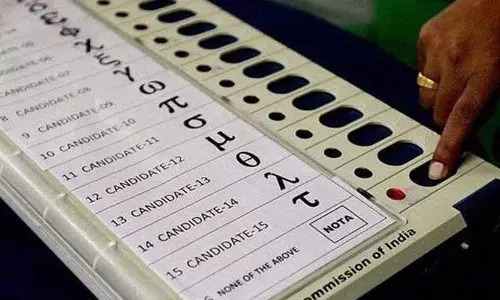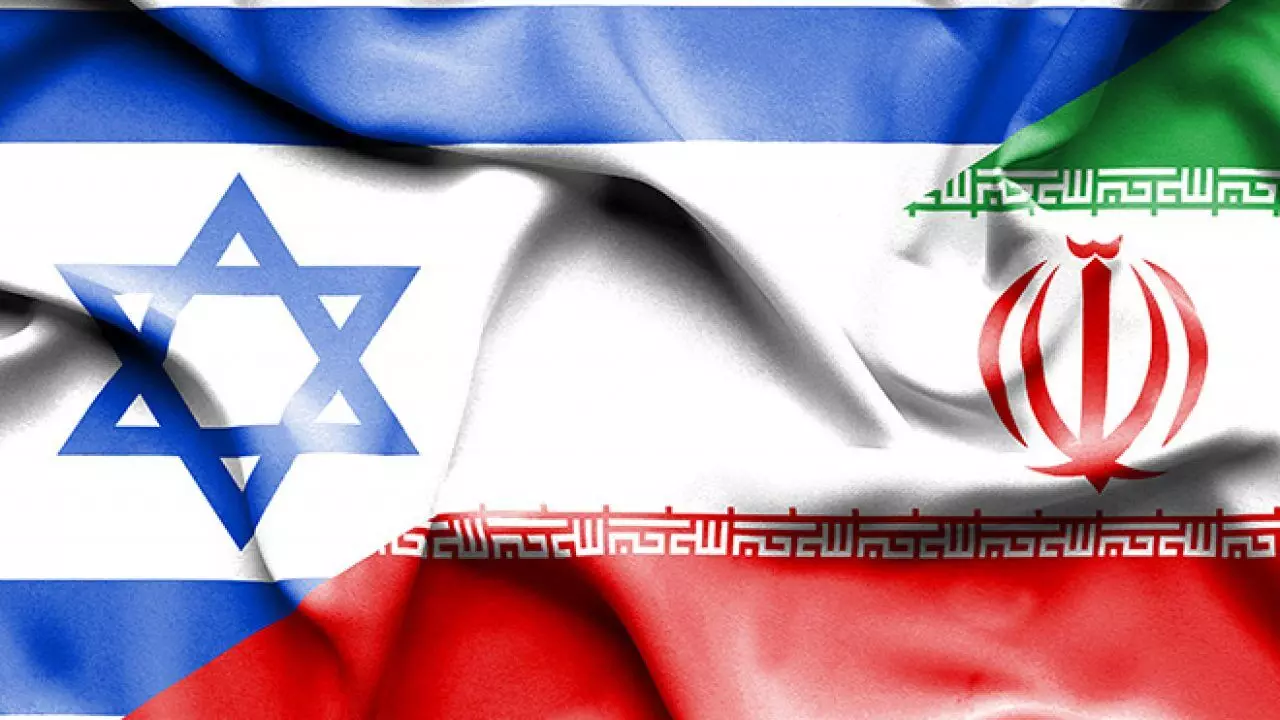
Shadowboxing between Israel and Iran!
text_fieldsIran and Israel are the two major powers in the Middle East. They are declared rivals vying with each other for dominance in the region. But, both of them now face internal as well as external challenges. It is Netanyahu’s sixth time government. But, it is a culmination of Israeli politics drifting farther and farther to the right- the violent right! The new coalition policies amount to de facto annexation of the occupied West Bank and the Jewish supremacy. According to the reports, Israeli forces have killed 65 Palestinians, including 13 children, this year so far, and injured hundreds of others, making the first two months of 2023 the deadliest for Palestine compared with the same period since 2000.
Now, at the time of writing this, Jordan is hosting a meeting between top Israeli and Palestinian officials in a bid to halt a surge in deadly violence in the occupied West Bank that has stoked fears of a wider escalation, according to officials. The meeting at Aqaba port in Jordan is attended by representatives from the United States and Egypt.
The policies of Prime Minister Benjamin Netanyahu’s newly sworn-in governing coalition brought out 80,000 protesters over the following weekend in Tel Aviv. The protesters were largely focused on the government’s proposals to overhaul the judicial system, which could weaken the country’s democracy and division of powers. But the effects of the policies on the 1.6 million Palestinian citizens of Israel and the 5.2 million Palestinians living in the occupied territories would be catastrophic, according to Israeli human rights organizations that say the policy of Israel constitute crimes against humanity. The US national security adviser Jake Sullivan met Israeli and PalestinIan leaders and he expressed serious doubts of how the Biden administration would cooperate with an Israeli government that has scratched off its liberal veneer and thrown away any pretence of negotiations toward a Palestinian state.
Judicial reform is a major program in Prime Minister Benjamin Netanyahu's government coalition, which includes ultra-Orthodox and far-right Jewish parties that took power in late December 2022. However, a large part of public opinion moved against this project. In Tel Aviv, demonstrations are still going on every Saturday evening, bringing together tens of thousands of demonstrators, who collectively condemn this project as well as the general policy of the government.
But, what can be done if the government is adamant to bring in the judicial reform? The Israeli parliament (the Knesset) approved two bills related to controversial judicial reform in its first reading, raising fears among its opponents that the country is drifting down an anti-democratic path. In an overnight vote, the deputies approved by 63 to 47 votes on these two texts related to changing the mechanism for selecting judges in Israel and introducing a “no-obligation” clause that allows Parliament to overturn some Supreme Court decisions by a simple majority. We know that this game is to protect Netanyahu from the alleged corruption charges!
Prime Minister Netanyahu had in the past flirted with commitment to a two-state future, Palestine and Israel side by side. But, the opening paragraph of the present government’s guidelines leaves no room for ambivalence: “The Jewish people have an exclusive and inalienable right to all parts of the Land of Israel.” The document further includes a commitment to promoting and developing settlement accordingly, to explicitly include the West Bank. This has long been the unequivocal position of certain senior members of the new government. Chief of them is Itamar Ben Gvir, a routine provocateur and a convicted supporter of terror and inciter of racism against Palestinians, and Bezalel Smotrich who has consistently called for territorial expansion and Palestinian Arab expulsion.
Ben Gvir is now national security minister that gives him policy- and priority-setting power over Israel’s police operating within Israel. Smotrich as a minister of Defense has the authority over policy related to Israeli settlements. Already, coalition agreements have been inked to legalize settlements previously illegal under Israel’s own law, and to commit to annexation of the West Bank, albeit on no clearly stipulated timeline.
Beyond, the proposal by Justice Minister Yariv Levin to overhaul the justice system, if enacted, would include an override clause effectively removing any check on legislative action. Among other interests, this would serve the agenda of those in the governing majority who wish to pursue retroactive legalization of settlements or other steps in the West Bank, such as demolitions, upon which the courts have previously served a restraint.
Now, the conflict between Israel and Palestine has surged. Because, The US favors Israel mainly out of the purpose to defend its interests in the Middle East in virtue of Israel, the staunchest ally of the US in the Middle East. Washington hopes to control the entire Middle East region by utilizing Israel. Hence, the violence in the Middle East can not be easily solved!
Netanyahu wants to maintain and develop Israel’s relationship with Arab countries by further strengthening "Abraham Accords." But, the ball today is in the court of Arab countries that have realized the difficulty of rapprochement with Israel without regard to the Palestinian issue. It seems that the aspirations of the new Israeli government will push some of the main regional players to reconsider their joining the normalization process. Netanyahu also seeks to draw attention to his insistence on using all available means to prevent Iran from turning into a nuclear state. But, Washington, at this juncture, lacks the enthusiasm for an armed conflict with Iran as it prefers, at this stage, to continue diplomatic pressure and the policy of sanctions. As Netanyahu was thinking of striking Iran and its nuclear and missile programs as a top priority he was subjected to a “bridling” process by the US administration.
The US sent three officials to him to “silence” him, starting with Jake Sullivan, the National Security Adviser, and then William Burns, the head of the Central Intelligence Agency (CIA) and finally Antony Blinken, the secretary of state. They delivered a clear message to him that he is not welcome for any harassment in Iranian affairs, at least for the time being, in light of the escalation of the Ukrainian war. What is certain is that there are no easy answers regarding the best way to tame Iran, if taming it is possible. Therefore, Israel seems to be waiting for an appropriate opportunity to strike at Iran.
Iran is in no better condition, better say, really in a real turmoil. It has multifaceted problems, political, economic, defensive and other forms of internal crises! With regard to economic sanctions, it could be acknowledged that this regime has learned to coexist with them despite their huge negative economic fallout and the suffering of the poorest classes. Tehran's relations with Russia, China, Iraq, Turkey, and others, have constituted outlets for it to circumvent it, and it seems that the West is hesitant or unable to take additional measures to enable and activate it. The relationship Iran wove with its proxies in the region has removed the borders between the inside and the outside, and became pawns to protect the existence of the regime through the local roles they are assigned to.
Everyone knows that there are no easy answers regarding the way to tame Iran, if taming it is possible. Many strategies flourished during the popular movement that erupted since the murder of the Iranian -Kurdish girl, Mahsa Amini, at the hands of the morality police. But, the revolts miserably failed! Israel sent three drones that managed, before shooting them down, to bomb the military base in Isfahan and some of its military factories, which were said to produce hypersonic missiles. It was a great embarrassment and a provocative challenge to the Iranian authorities! It took place at a carefully chosen time while the celebrations had begun on the occasion of the annual victory of the Khomeini Islamic Revolution. But Iran, based on similar previous experiences, was not in a hurry to respond. Iran engaged in conducting their psychological warfare against Israel. Perhaps the publication of a video by “Tasnim” news agency from an exhibition of military weapons in the city of Isfahan, which included a display of a “surface-to-air” missile with “Death to Israel” written on it in Hebrew, was a warning message to the Israeli occupation state.
The American Wall Street Journal revealed that Moscow and Tehran are planning to build a factory in Russia to produce thousands of drones (6,000 drones annually). A high-ranking Iranian delegation, headed by Major General Abdullah Mehrabi arrived in the Russian capital to supervise the construction process of the plant. These developments reveal very advanced Iranian military preparations, as they also reflect an integrated Iranian-Russian defense partnership whose most prominent title is technological exchange in all sectors.
While writing these words, the Iranian president and his accompanying delegation have landed in the Chinese capital “Beijing” to open a new chapter in Iranian-Chinese relations. This journey is for the coordination of a strategic program between the two countries that began in 2015 during the visit of Chinese President “Xi Jinping” to Iran. It is a “comprehensive strategic partnership” between the two countries which Iranian press calls the “Lion and Dragon Pact.”
This is not an ordinary agreement to enhance cooperation between two countries. A pivotal shift seems to have appeared in the history of relations between the two countries. Its effects in the future will be of great regional and international concern , especially for the United States. The strategic cooperation will be two-pronged: the first is Iran, where Tehran turns from an important regional player into an influential player in the international arena alongside the big ones, and the second direction is the continuous and escalating Chinese advance and China’s ability to attract more countries willing to cooperate with it according to the logic of mutual interests and not imposition, hegemony and arrogance. . In short, Washington views the agreement as undermining its influence in the West Asian region.
Farzin Nadimi, a defence and security analyst and associate fellow at the Washington Institute for Near East Policy, predicts that these attacks will likely increase “in size and numbers” since “the Iranian regime is expected to accelerate all its offensive deterrent programs in the future.” Despite an “ever-existing risk of escalation at any moment,” he is unsure whether there could be an all-out war between Israel and Iran in 2023. Nevertheless, he believes “a serious exchange before 2025 is a possibility.” Let the world be cautious about these portents and may God save us from the awful catastrophe!
























